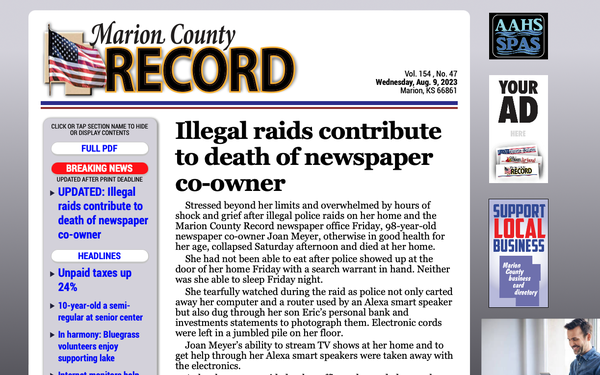
The publishing world is
roiling over the Friday raid of the Marion County Record, a local newspaper, by Kansas law enforcement.
Police seized computers, servers and call phones, and also raided the
home of the owner and that of a semiretired editor in a sweep that many observers see as a serious breach of press freedom, according to published reports.
(The raid on the home
of Eric Meyer resulted in the death of co-owner Joan Meyer, Meyer's mother, Eric Meyer alleges).
A coalition consisting of 34 news organizations and press advocate groups signed
a letter put out on Sunday by the Reporters Committee for Freedom of the Press. The signees include Bloomberg L.P., CBS News, Dow Jones & Company, The New York Times Company, The Washington Post,
Hearst Corporation, Gannett, Reuters News & Media Inc., The New Yorker, the News/Media Alliance and Pro Publica Inc.
advertisement
advertisement
The letter, addressed to Chief of Police
Gideon Cody of the Marion Police Department, warns that the seizures may have violated federal law, and argues that it is “well-settled First Amendment law that the possession of material
that may have been acquired unlawfully in the first instance by a source, but where the news organization has not participated in the underlying offense, is constitutionally protected."
As
Cody himself had acknowledged in a statement, the Federal Privacy Protection Act of 1980 (the PPA) protects the flow of information to journalists by “prohibiting law enforcement, including
local agencies, from searching for or seizing journalistic work product or documentary materials, except in narrow, exceptional circumstances.”
The search was part of an
“identity theft” probe into how the Record obtained information about a local restaurateur’s driving record, according to the reports.
The
coalition letter notes that, based on media reporting, “the raid followed the Record having received information from a source, attempting to verify that information through a state
website available to the public, and thereafter, alerting your department out of concern that, according to the owner and publisher of the paper, the paper was being 'set
up.'”
The letter contends that “search warrants based on the mere receipt or withholding of work product material are virtually always proscribed with only
limited exceptions.”
It states that newsroom searches and seizures are “among the most intrusive actions law enforcement can take with respect to the free press,
and the most potentially suppressive of free speech by the press and the public.”
In an email to the New York Times, Cody said, “I believe when
the rest of the story is available to the public, the judicial system that is being questioned will be vindicated.”
This story was updated.